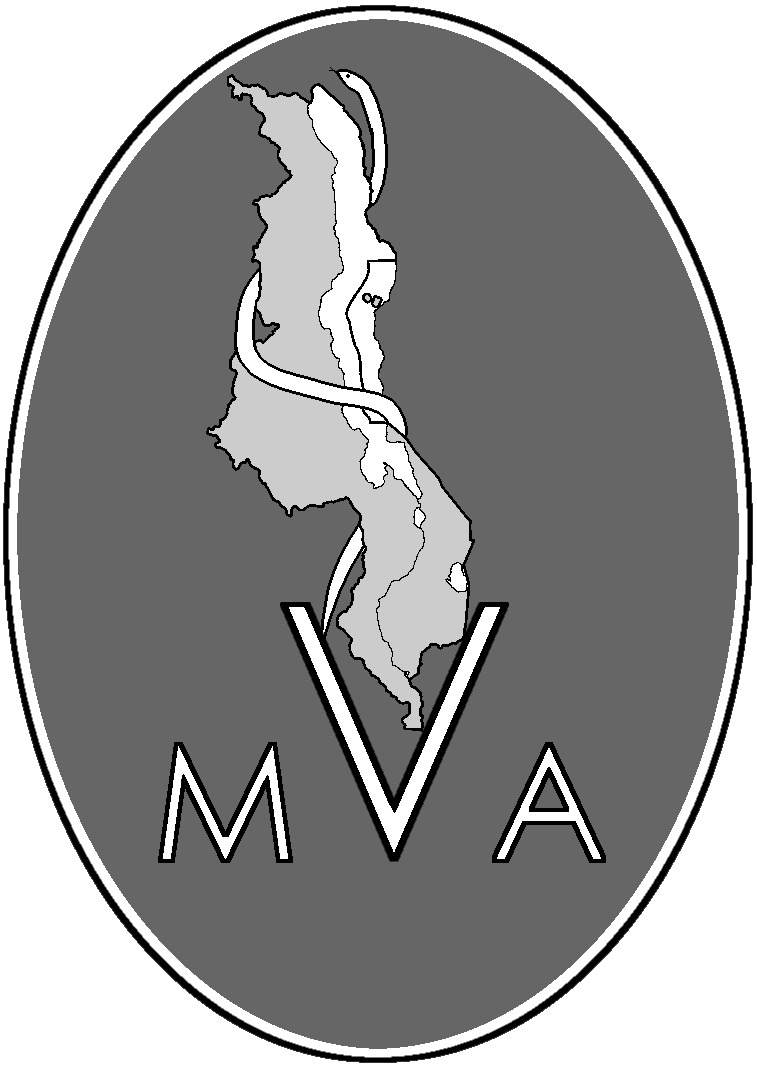Malawi Veterinary Association
The Warm Heart of the African Veterinary Profession

The MVA
The Malawi Veterinary Association was established in 1959. Its role is to represent the profession in dealing with government and the broader community.
The membership of MVA consists of veterinarians registered as veterinary surgeons under the Veterinary and Para-Veterinary Practitioners Act.
MVA is a member of the Commonwealth Veterinary Association. The current Councillor is Dr Edwin Nkhulungo.
The MVA strives to maintain close links with the World Small Animal Veterinary Association and World Veterinary Association.
Current MVA Executive
Objectives of the Association
The objectives of the MVA as outlined in its Constitution are as follows:
- The promotion, maintenance and advancement of the interest of the Veterinary profession in the country.
- The promotion of cooperation between the Association and other national and international professional organizations and associations.
- The promotion of fields of veterinary activities by any proper means including-
- The organization of congresses and seminars; and
- The establishment and maintenance of organs for dissemination of information by use of the press and broadcasting facilities on matters of professional interest including the publication of journals and bulletins for the benefit of all members in Malawi;
- To foster good relationship and understanding between the Association on the one hand and the Government and local authorities on the other;
- To support the improvement of teaching, training and research in allied sciences; and
- To maintain the ethics and honour of the veterinary profession.
The MVA is registered under the Trustees Incorporation Act.
As the collective voice of the veterinary profession in Malawi, the MVA has close and regular contact with the Government of Malawi on many aspects of policy on livestock and other animals. In fact many members of the MVA are currently, or have been, employees of the Malawi government and thus there is a very good liaison and understanding between the profession and government.
The Agriculture Sector in Malawi
The Agricultural sector is the most important sector in Malawi as it employs about 80 percent of the workforce and contributes over 80 percent to foreign exchange earnings. The sector also contributes significantly to both national and household food security. The agriculture sector in Malawi is composed of the estate and smallholder subsectors which complement each other towards attaining food and nutrition security as well as poverty reduction and growth of the economy. While the estate subsector is characterized by commercial and market oriented production, the small holder sub-sector operates to achieve production for subsistence consumption with surplus for sale. Over the past decades the agriculture policy was aligned towards achieving food security under a market which was not liberalized. During 1990s the policy shifted in favour of market liberalization in order to respond to changing circumstances. It was also realized that diversified agriculture production would promote availability of diverse food crops and livestock for the enhancement of human nutrition and source of foreign exchange.
Despite such efforts in the sector, poverty has remained widespread and severe. In addition there has been an emergence of new demands for the services which the Ministry could not cope without the help from projects. The Malawian Agricultural sector whose vision is that of a nation that enjoys increased agricultural productivity to ensure food security and suitable agricultural growth and development strives to accomplish a mission that aims at promoting and facilitating agricultural productivity and sustainable management and efficient use of land based natural resources to ensure food security and increased incomes to improve sustainable socio economic growth and development.
The sector is mandated to promote and accelerate broad based sustainable agricultural development policies to enhance economic growth and contribute to poverty reduction. The sector attempts to fulfil this mandate through the pursuance of the following functions that are aimed at:
- Increasing agriculture productivity and diversification for food and nutrition security.
- Promoting key agricultural commodities value chain for both domestic and export markets.
- Increasing agricultural production and productivity through irrigation intensification in collaboration with the Department of Irrigation.
- Enhancing resilience to climate change risks and impacts.
- Promoting equitable access to land and tenure security and orderly use of land and land based resource.
- Promoting production of livestock and fisheries.
The Livestock Subsector
The Livestock subsector in Malawi falls under the Ministry of Agriculture, Irrigation and Water development. It contributes about 11% to the total Gross Domestic Product (GDP) and about 36 % the value of total agricultural products taking into consideration other uses of livestock such as food provision, income, manure, animal traction and social security.
Malawi has various livestock species but the notable ones with socio-economic importance include: cattle with estimated population of 1,357,679 cattle, 6, 318,277 goats, 3,488,892 pigs, 269,689 sheep and over 73,612,306 chickens (DAHLD, 2015)
The Department of Animal Health and Livestock Development (DAHLD) is mandated to promote animal health and production including control of animal diseases to ensure that Malawi produces its own livestock and livestock products which are safe for human consumption and export the surplus to generate income. The department envisions Malawi as a nation that is self-sufficient in safe locally produced livestock and livestock products. The livestock department aims at achieving a sustainable livestock development so as to improve nutritional well-being of Malawians and improved rural livelihoods while guaranteeing the safety of the general public from consumption and utilization of livestock products and by-products.
